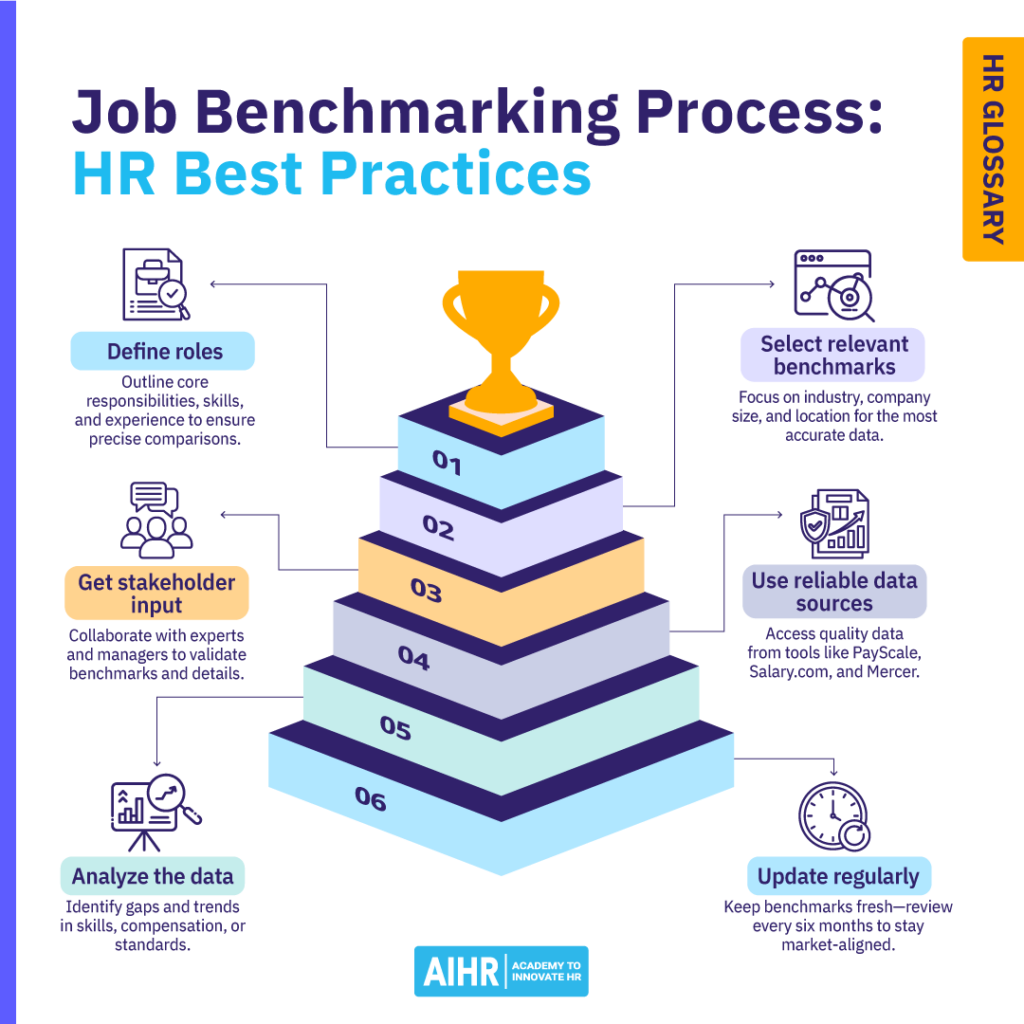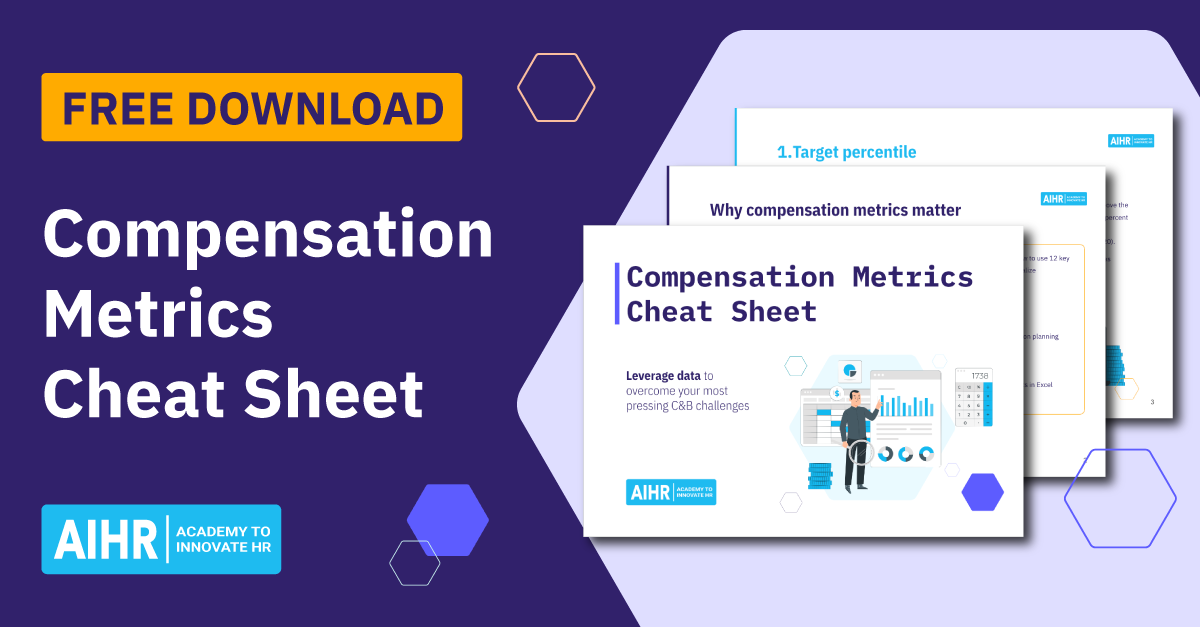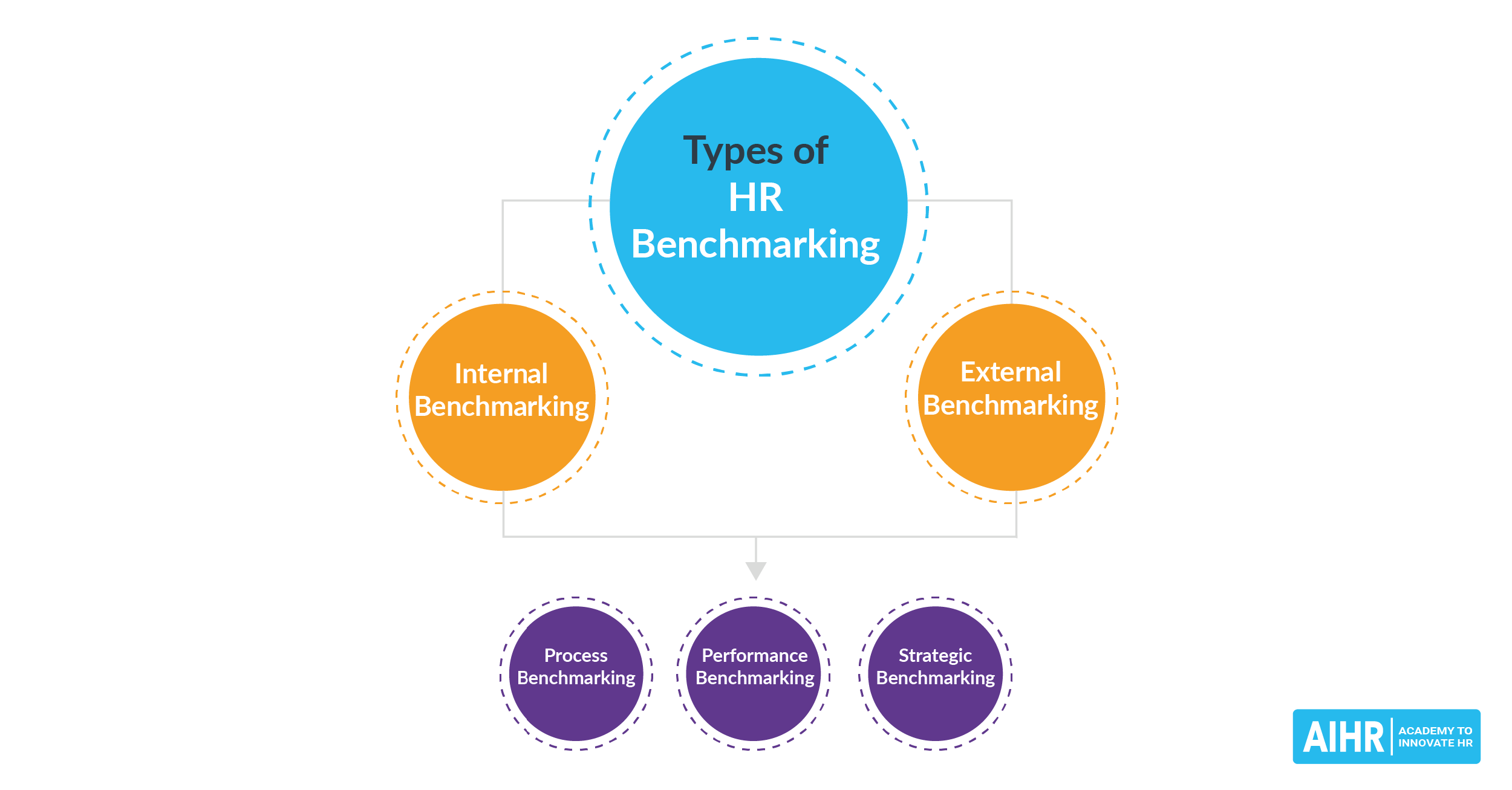Job Benchmarking
What is job benchmarking?
Job benchmarking involves comparing specific positions in an organization with similar roles (i.e., benchmark jobs) in the industry. This data-driven approach analyzes a role’s qualifications, skills, responsibilities, compensation and benefits, and more.
HR professionals use job benchmarking as a strategic tool to compare existing positions with other benchmark jobs. This allows them to create better job descriptions, offer competitive compensation packages, identify skills gaps, and keep up with industry trends.
Why is job benchmarking important?
Job benchmarking is as essential as HR practices like hiring, training, performance management, and retention. Here are some key benefits of this process:
- Clearly defined job responsibilities: Comparing the key duties of similar positions allows you to create more accurate job descriptions with more clearly defined responsibilities.
- Competitive compensation: By evaluating existing positions against benchmark jobs in other industries, you can objectively assess if your company’s compensation levels are competitive enough to attract and retain top talent.
- Employee development support: If similar positions in the market require certain competencies current employees lack, you can develop more targeted training programs to help them develop those critical skills.
- Fairness and consistency: By determining if your organization’s existing positions align with similar ones in your industry, you can help ensure the company’s employment standards and practices are fair and consistent.
- Improved internal mobility: Reviewing job benchmarking data can help in assessing if existing employees have the necessary skills, qualifications, and experience to step into more senior or specialized roles.
Benchmark jobs vs non-benchmark jobs
Not all jobs can be benchmarked. Benchmark jobs are clearly defined, specific, and measurable, with widely available data and established industry standards. Non-benchmark jobs can’t be easily measured, as their performance standards are usually more subjective.
Here are some key differences between benchmark and non-benchmark jobs:
Definition
Jobs commonly found across industries that can be used for comparison in salary surveys.
Unique or specialized roles not widely available for salary comparisons.
Standardization
Highly standardized, with a structured overview of job responsibilities, skills, and qualifications.
More variability in terms of job requirements.
Compensation data
Comprehensive information available on salary ranges, benefits, and other incentives.
Limited available external data, making it more difficult to determine competitive compensation.
Performance management
More defined performance metrics that enable more effective performance management.
Limited supporting data may make performance assessments more subjective.
Examples
Project manager, data analyst, sales manager, or HR specialist.
Art director, graphic designer, copywriter, or corporate trainer.
Job benchmarking software
Job benchmarking can take significant time and effort. Here are some software tools you can use to make the process easier and more effective:
- Salary.com: Salary.com provides access to a large compensation and job benchmarking database. The software enables organizations to compare roles, salaries, and benefits within their industries to create competitive compensation plans.
- Glassdoor: You can use Glassdoor’s job search platform’s data as part of your competitor analysis by benchmarking based on specific positions’ overall job satisfaction, interview processes, and compensation packages.
- O*NET: O*NET is a comprehensive online database funded by the U.S. Department of Labor. It’s a valuable resource for job benchmarking as it has detailed data on job descriptions, required skills, knowledge, and work activities.
- Mercer: Leading global consulting firm Mercer offers a range of talent management tools with comprehensive market data and analytics for benchmarking jobs.
Job benchmarking process: 6 best HR practices
Follow these best practices to develop a thorough benchmarking process:

- Define the roles: To make job comparisons as precise as possible, outline each role’s core responsibilities, required skills, and desired experience.
- Select relevant benchmarks: Focus on similar industries, company sizes, and geographic locations to find the most useful data. A common framework will help you gain accurate and practical insights.
- Get input from key stakeholders: Tap into the expertise of subject matter experts, managers, and relevant team members to review key information and chosen benchmarks. This extra step allows you to focus on the right benchmarking details.
- Use reliable data sources: The accuracy of your benchmarking depends on quality data. Choose trustworthy benchmarking tools, industry reports, and compensation surveys, such as those from PayScale, Salary.com, or Mercer.
- Analyze the data: Concentrate on aspects that may differ from your existing positions. Identify any gaps, areas for improvement, or significant changes in industry standards, compensation, or skill requirements.
- Update benchmarks regularly: To stay ahead of job market changes and emerging skills, make sure your benchmarking data is always relevant. Keep up with industry trends and update benchmarks regularly (e.g., every six months).
HR tip
Involve department leaders and key stakeholders in the benchmarking process. Their insights can help validate the relevance of the benchmarks chosen and highlight any specific requirements for roles that might not be obvious from external data alone. This collaboration leads to more accurate comparisons.
FAQ
Benchmarking in employment is the process of comparing specific job roles within an organization to similar roles in the industry. This helps employers assess responsibilities, skills, and compensation to stay competitive and aligned with market standards.
A benchmark job is one that’s common across many organizations and has standardized duties, like an HR Specialist, Project Manager, or Sales Manager. These roles have widely available compensation and skill data, making them ideal for comparison.









